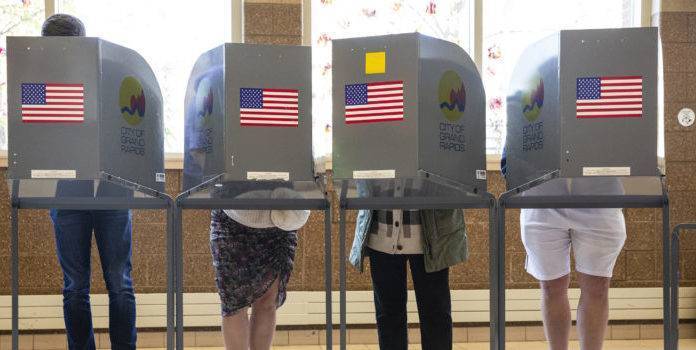(Headline USA) In the midterm elections, evangelical Christians across the nation reconfirmed their religious convictions by supporting candidates who opposed killing unborn babies and stripping citizens of their religious freedoms and First Amendment rights.
Meanwhile, Catholic voters once again showed how closely divided they are — even on abortion, which the Vatican has long made clear is a sin.
On a successful, high-profile ballot measure in the battleground state of Michigan, proposing to enshrine abortion rights in the state constitution, Catholic voters split about evenly, according to AP VoteCast, an expansive survey of more than 94,000 voters across the country.
In Kentucky, a reliably Republican state, voters rejected a GOP-backed ballot measure aimed at denying any state constitutional protections for abortion. Among those voting No were 60% of Catholic voters, according to VoteCast.
In contrast, about two-thirds of white evangelical voters in both Kentucky and Michigan voted against protecting abortion access.
Albert Mohler, president of Southern Baptist Theological Seminary in Louisville, Kentucky, said rejection of that measure in his state was an “unmitigated disaster.”
He was less surprised by so-called abortion-rights amendments passing in more liberal Vermont and California and centrist Michigan. But the Kentucky vote was the “hardest loss” and followed a similar vote in August in another red state, Kansas.
Mohler said it’s important for abortion opponents to be willing to enact their views into policy.
Voters “who voted for pro-life candidates turned around and voted against a pro-life constitutional amendment,” Mohler lamented.
On the opposite side of the fight, Catholics for Choice president Jamie Manson said abortion access protections are popular.
“In red states and blue states, with religious voters and secular voters, wherever abortion was on the ballot, abortion rights disproportionately won,” she said in a statement.
John Fea, a professor of American history at Messiah University in Mechanicsburg, Pennsylvania, said the Kentucky vote signaled that many Americans seem to want the status quo provided under the 1973 Roe v. Wade decision. It legalized abortion nationwide — with some limits — until it was overturned by the U.S. Supreme Court in June.
“Most of the country wants some restrictions on abortion, but they don’t want bans,” Fea said. “The Christian right, despite the fact that they got what they wanted with the overturning of Roe, is not getting the extent of the victory they had hoped.”
Only about one in 10 voters nationwide and across most states say abortion should be illegal in all cases, according to AP VoteCast. Even among white evangelical voters, while most say abortion should generally be illegal, only about two in 10 say abortion should be illegal in all cases.
Despite setbacks on the ballot measures, pro-life supporters took heart from some other election results. Michael New, who teaches social research at The Catholic University of America, cited the comfortable re-election victories for GOP Govs. Greg Abbott in Texas, Brian Kemp in Georgia, Ron DeSantis in Florida and Mike DeWine in Ohio.
“All these governors signed strong pro-life laws and did not hide from the abortion issue,” New said.
According to VoteCast, about 4 in 10 Catholics voting in the midterm elections identified as Democrats; about half as Republicans. A breakdown of some high-profile races for governor and for U.S. Senate illustrated how these voters are very much a swing constituency.
In Wisconsin, Catholic voters slightly favored Republicans in those two races.
In Pennsylvania, Catholics were slightly more likely to have voted for the Republican loser in the Senate race, Mehmet Oz, but more likely to vote for the Democrat winner in the governor’s race, Josh Shapiro. Oz is Muslim and Shapiro is Jewish.
In Arizona, Catholic voters were evenly divided between the Democrat and Republican candidates for governor, while about 60% backed Democrat Mark Kelly, seeking re-election to the Senate. The tight races in Arizona remain uncalled by The Associated Press.
In each of those three states, roughly two-thirds or more of white evangelical Christian voters backed the GOP candidates.
Large majorities of voters who describe themselves as nonreligious voted for the Democrats and supported abortion in their decisions on the Michigan and Kentucky ballot measures.
Overall, among voters nationwide, about 4 in 10 say they attend religious services at least monthly; about a third say they never attend. About a fifth say they go once a week or more.
Democrats largely attend religious services less frequently – about 7 in 10 go less than monthly. Among Republicans, 46% attend at least monthly, while 54% go less often.
Adapted from reporting by the Associated Press

